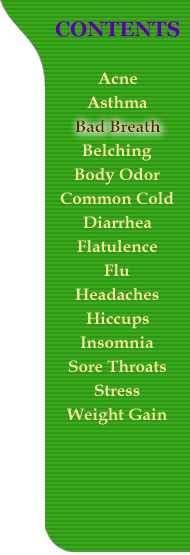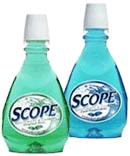| The problem
of halitosis or bad breath has plagued mankind for centuries leaving few
people laughing about it. To conquer bad breath, the ancient Greeks reputedly
rinsed with white wine, anise seed, and myrrh, while the Italians mixed
up a mouthwash of sage, cinnamon, juniper seeds, root of cypress and rosemary
leaves.
Many people worry about bad breath than about any other common medical problem. Maybe the explanation is the simple fact that you can't really tell whether you've got bad breath. This is atime when you have to depend on the honesty and kindness of friends to let you know. Most of us are immune to our own breath. Fixing bad breath depends on what's causing it. In 80 to 90 percent of cases, it's due to something in the mouth. Most often, bad breath is the result of nothing moew serious than adirty mouth. Plague, the nearly invisible film of bacteria that's constantly forming in your mouth, is often responsible. Other dental culprits include cavities and gum disease. The strong odors of foods like garlic, onions and alcohol are carried through the bloodstream and exhaled by the lungs. In addition, some health problems, such as sinus infections or diabetes can cause bad breath. Figuring out the cause of bad breath is the first step in doing something about it. Here's what you can do to keep your breath as fresh as possible: Keep your mouth clean. That is the key thing remember and that means a thorough brushing twice a day. It also means flossing regularly. Food and bacteria trapped between teeth and at the gum line can only be removed with floss; if it's left to linger, it's not going to smell pleasant at all. Clean your tongue, too. Bacteria left on your tongue can certainly contribte to less-than-fresh breath, so be sure to brush you tongue after you've polished your pearly whites. Wet your whistle. A dry mouth can equal smelly breath. Saliva helps clean you mouth; it has a naural antibacterial actionand it washes away food particles. It's the reduced salica flow at night that explains morning breath. Try chewing sugarless gum or sucking on sugarless mints to stimulate saliva production. Rinse. If nothing else, at least rinse your moth with plain water after eating. Swishing the water around the mouth may help to remove some of the food particles left in the mouth after a meal. Munch on parsley. That green sprig of parsley that came with your meal can do more than decorate your plate. While muching on parsley or spearmint won't cure bad breath, the scent of the herb itself can help temporarily cover up offending oral odor. You're basically trading an offensive odor for a more scceptable one. Eat to smell sweet. Foods that help fight plague may also help fight moth odor. Opt for celery, carrots, peanuts or a bit of low-fat cheese if you want something to snack on. A healthy diet will help your teeth as well. |

 |
|
|
What's Up Doc?
Persistent
bad breath
|
||
|
What About
Mouthwash Mouthwashers will cover
odors. The effects, however, are short
- lived. Dental researchers
agree that commercial
mouthwashes
|
||